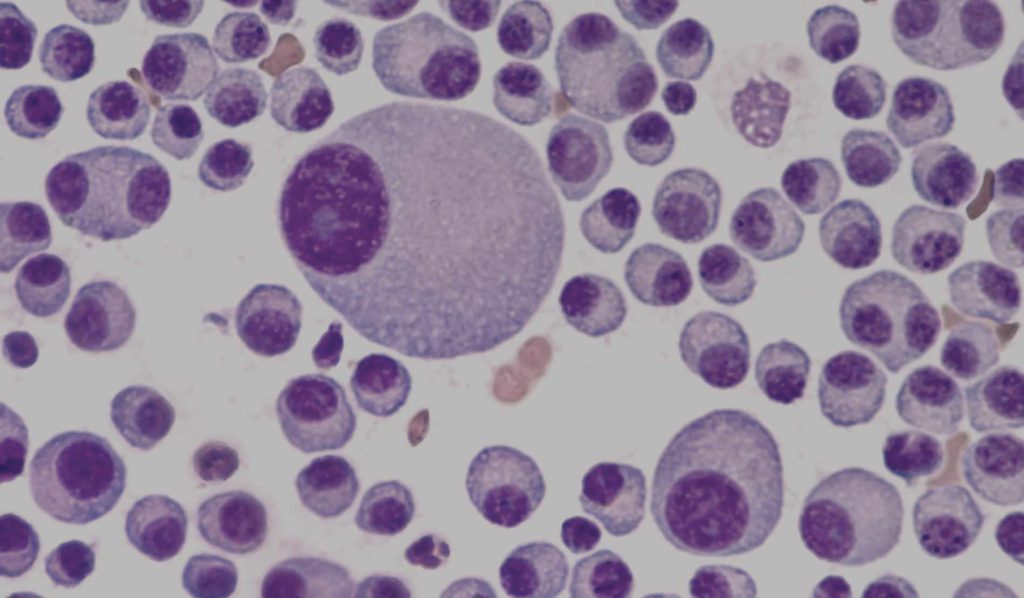Amyotrophic lateral sclerosis
ALS and stem cells
Amyotrophic Lateral Sclerosis, (ALS) is a serious but unusual neurodegenerative disease, for which there is currently no cure. Every year, just over 200 people are diagnosed with the disease in Sweden. ALS affect the nerve cells that control voluntary muscle movements, such as walking and talking, swallowing and breathing (motor neurons)1. Clinical symptoms consist of a gradual weakening and atrophy of muscles. Death usually occurs within 5 years of diagnosis and is mainly due to paralysis of the respiratory muscles2.
The mechanisms by which ALS develops are not completely mapped, but disease mechanisms may include both glial cells and nerve cells3. There is currently only one approved drug in Europe, Riluzol®, which can prolong survival by 3 months4.
In recent years, mesenchymal stem cells, MSCs have been recognized as a potential candidate in cell therapy of neurodegenerative diseases, due to their regenerative properties.
The immunomodulatory properties of MSCs also play an important role in the treatment of inflammatory diseases, including neurodegenerative diseases.
Many clinical trials have been performed on ALS patients especially with MSC from bone marrow. Most of them are phase I/II studies to show safety in transplantation, but some progress has already been observed5-7.
In 2014, the first stem cell therapy for the treatment of ALS was launched in South Korea.
The treatment is based on autologous mesenchymal stem cells from the bone marrow. This involves extracting bone marrow from the patient, isolating and culturing MSCs, mixing them with cerebrospinal fluid, CSF collected and administering the final product into the CSF, by a so-called intrathecal injection. Data from clinical trials show that intrathecal injections of bone marrow mesenchymal stem cells slow the progression of ALS based on evaluations of changes in ALSFRS-R, (ALS Functional Rating Scale Revised) in ALS patients8,9.
In a case-control study, Barczewska and colleagues studied the safety and efficacy of three intrathecal injections of umbilical cord mesenchymal stem cells in ALS patients10.
The participants were 67 patients who received treatments with MSCs from the umbilical cord, and 67 control patients. The patients in the treatment and control group were matched in terms of gender, symptoms, ethnicity, stage of disease at the beginning of the treatment, and ALS medication. The 67 patients in the group who received treatment received three intrathecal injections with 30×10^6 MSCs every two months. The effect of the treatment was studied in the form of progression of the disease and survival time. Patients were assessed using the ALSFRS-R scale. The survival time was followed up until March 2020.
Results from this study confirm previously published ALS studies showing the safety and/or efficacy of MSC administration in smaller studies5-8,11-13. The median survival increased to twice in all subgroups of patients treated with mesenchymal stem cells. What distinguishes the participants in the subgroups are demographic and clinical factors. Regarding disease progression, three types of response were measured with ALSFRS-R, decreased progression (n=21, 31.3 %), no change in progression (n=33, 49.3 %) and increased progression (n=13, 19,4 %). Risk benefit was favourable in all groups. No serious side effects were observed.
Mechanisms of action for MSCs after transplantation in ALS, include promoting the formation of neurons, reducing cell death, reducing free radical levels, stimulating synaptic connections from damaged neurons, and releasing various neurotrophic factors.
Neurotrophic factors are small molecules, that support the growth, survival and development of neurons. MSC also have the potential to regulate inflammation, mainly by releasing signalling molecules that affect other cells.
References
- Shook, S. J. & Pioro, E. P. Racing against the clock: recognizing, differentiating, diagnosing, and referring the amyotrophic lateral sclerosis patient. Ann Neurol 65 Suppl 1, S10-16, doi:10.1002/ana.21545 (2009).
- Kim, S. U., Lee, H. J. & Kim, Y. B. Neural stem cell-based treatment for neurodegenerative diseases. Neuropathology 33, 491-504, doi:10.1111/neup.12020 (2013).
- Swinnen, B. & Robberecht, W. The phenotypic variability of amyotrophic lateral sclerosis. Nat Rev Neurol 10, 661-670, doi:10.1038/nrneurol.2014.184 (2014).
- Lacomblez, L., Bensimon, G., Leigh, P. N., Guillet, P. & Meininger, V. Dose-ranging study of riluzole in amyotrophic lateral sclerosis. Amyotrophic Lateral Sclerosis/Riluzole Study Group II. Lancet 347, 1425-1431, doi:10.1016/s0140-6736(96)91680-3 (1996).
- Karussis, D. et al. Safety and immunological effects of mesenchymal stem cell transplantation in patients with multiple sclerosis and amyotrophic lateral sclerosis. Arch Neurol 67, 1187-1194, doi:10.1001/archneurol.2010.248 (2010).
- Mazzini, L. et al. Mesenchymal stem cell transplantation in amyotrophic lateral sclerosis: A Phase I clinical trial. Exp Neurol 223, 229-237, doi:10.1016/j.expneurol.2009.08.007 (2010).
- Prabhakar, S. et al. Autologous bone marrow-derived stem cells in amyotrophic lateral sclerosis: a pilot study. Neurol India 60, 465-469, doi:10.4103/0028-3886.103185 (2012).
- Oh, K. W. et al. Phase I trial of repeated intrathecal autologous bone marrow-derived mesenchymal stromal cells in amyotrophic lateral sclerosis. Stem Cells Transl Med 4, 590-597, doi:10.5966/sctm.2014-0212 (2015).
- Oh, K. W. et al. Repeated Intrathecal Mesenchymal Stem Cells for Amyotrophic Lateral Sclerosis. Ann Neurol 84, 361-373, doi:10.1002/ana.25302 (2018).
- Barczewska, M., Maksymowicz, S., Zdolinska-Malinowska, I., Siwek, T. & Grudniak, M. Umbilical Cord Mesenchymal Stem Cells in Amyotrophic Lateral Sclerosis: an Original Study. Stem Cell Rev Rep 16, 922-932, doi:10.1007/s12015-020-10016-7 (2020).
- Mazzini, L. et al. Mesenchymal stromal cell transplantation in amyotrophic lateral sclerosis: a long-term safety study. Cytotherapy 14, 56-60, doi:10.3109/14653249.2011.613929 (2012).
- Petrou, P. et al. Safety and Clinical Effects of Mesenchymal Stem Cells Secreting Neurotrophic Factor Transplantation in Patients With Amyotrophic Lateral Sclerosis: Results of Phase 1/2 and 2a Clinical Trials. JAMA Neurol 73, 337-344, doi:10.1001/jamaneurol.2015.4321 (2016).
- Barczewska, M. et al. Safety of intrathecal injection of Wharton’s jelly-derived mesenchymal stem cells in amyotrophic lateral sclerosis therapy. Neural Regen Res 14, 313-318, doi:10.4103/1673-5374.243723 (2019).



